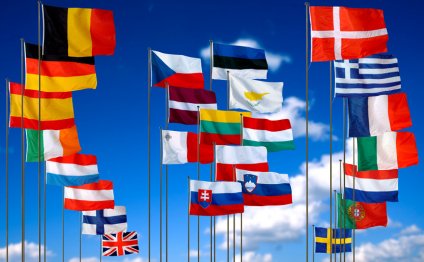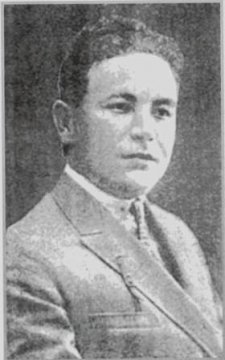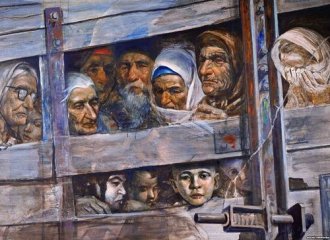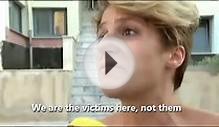
European
 whenever Crimean Tatar singer Jamala won Eurovision 2016 for Ukraine this weekend with a song about the woman people’s tragedy, she was following a custom of telling the Crimean Tatar experience of exile through verse and tale.
whenever Crimean Tatar singer Jamala won Eurovision 2016 for Ukraine this weekend with a song about the woman people’s tragedy, she was following a custom of telling the Crimean Tatar experience of exile through verse and tale.
Jamala at a "meet & greet" look through the Eurovision tune Contest 2016 in Stockholm (From Wikimedia Commons. Photo by Albin Olsson License: CC BY-SA 4.0 )
Here is a youthful example:
Hey, take, swallow! Distribute your wings wide!
If you get caught because of the opponent on the ground,
Maybe you are deprived of a homeland, just like the Tatar!
.
Sorrowful men and women, great individuals! People with stunted lung area!
I was produced amidst you, I am certainly one of you. I will be a weed within yard,
I'm a weed in your garden.
(From Kollar Demir, Bas Emen, Budapest, 1919)
Mcdougal, Bekir Çobanzade (1893-1937), had been a Crimean Tatar linguist and academic just who studied and taught in Crimea, chicken, Hungary and Azerbaijan. His poems and tales present a lyrical, personal grief within fate for the Muslim Turkic Crimean Tatars, the native folks of Crimea. Under repressive Russian Imperial rule thousands emigrated to seek better everyday lives. Soviet authorities, after a brief period of encouraging national minorities, finished the exodus by forcibly deporting the entire nation in 1944 – the subject of Jamala’s winning tune.
 Photograph of Çobanzade, very first posted in his poetry collection Boran (1928) From: D.P. Ursu. Bekir Choban-Zade (Simferopol, 2013), YF.2015.a.1408
Photograph of Çobanzade, very first posted in his poetry collection Boran (1928) From: D.P. Ursu. Bekir Choban-Zade (Simferopol, 2013), YF.2015.a.1408
Çobanzade didn't stay to see this final atrocity, which wiped out an estimated 46 percent of their nation. In 1937 he was performed for separatism, involvement in terrorism, and working as a foreign broker. He had been rehabilitated in the 1950s.
The words to Jamala’s song ‘1944’ start:
Whenever strangers are arriving...
They show up to your house,
They eliminate you all
and state,
We’re simple […]
Yaşlığıma toyalmadım
Men bu yerde yaşalmadım
[i possibly could perhaps not spend my childhood there/ as you took away my land]
In light of Eurovision guidelines that songs be apolitical, Jamala states the song is certainly not political but individual, telling the story of her grandma who was simply deported. Every Crimean Tatar family residing Crimea during those times has actually this same tale. Whenever I had been studying Dream Land (2008), my novel concerning the deportation and return house of Crimean Tatars virtually fifty years later, I heard it over and over repeatedly. I was fortunate to interview many people who remembered the deportation, and Crimea before it – a land of roses and sunshine, but additionally of war and state-sponsored cruelty.
This generation is quick disappearing: one story recounted in fantasy Land, of Seit-Amet whom fought into the Russo-Japanese war plus the First World War in place of their two brothers, had been told if you ask me by Seit-Amet’s boy before he died in 2011. However the tales are passed on to people who had been created in exile, or back in Crimea after Perestroika which permitted them to go back. I became hit by the incredible vividness of the collective memory; usually younger years can recite their particular parents’ or grandparents’ knowledge as though that they had lived through it themselves. Greta Uehling explores this sensation in her own 2004 book Beyond Memory: The Crimean Tatars’ Deportation and Return.
 The deportation, or Sürgünlik, had been a nation-defining event. Individuals were sent away on the basis of their nationwide identity that your Soviet authorities then tried to obliterate, saying there had been no such national group while the Crimean Tatars. During exile a great deal Crimean Tatar culture and language had been lost, but at precisely the same time a campaigning National motion was created, uniting a complete generation which defined itself because of the dedication to come back to a lost homeland – and as a consequence, in opposition to Soviet authorities. Thus, while for virtually any Crimean Tatar the deportation is an individual family story, furthermore political, and provided memory of this occasion notifies existing Crimean Tatar resistance to Russian annexation of Crimea.
The deportation, or Sürgünlik, had been a nation-defining event. Individuals were sent away on the basis of their nationwide identity that your Soviet authorities then tried to obliterate, saying there had been no such national group while the Crimean Tatars. During exile a great deal Crimean Tatar culture and language had been lost, but at precisely the same time a campaigning National motion was created, uniting a complete generation which defined itself because of the dedication to come back to a lost homeland – and as a consequence, in opposition to Soviet authorities. Thus, while for virtually any Crimean Tatar the deportation is an individual family story, furthermore political, and provided memory of this occasion notifies existing Crimean Tatar resistance to Russian annexation of Crimea.
Death Train-2. Artwork by Rustem Eminov (From
On 18 May 1944, once the bewildered Crimean Tatars – the majority females and children, once the guys had been battling in the Red Army – asked the Soviet troops why they certainly were pushing households from their houses, they reportedly responded “It’s maybe not our fault – it is Stalin’s orders.” The 2008 book and BBC sets World War Two: Behind Closed Doors by Laurence Rees includes interviews with a few troops which participated in wartime Soviet atrocities, such as the deportation for the Crimean Tatars. Many repeat which they were only after requests. “I understand that it was cruel because I’m more knowledgeable today, ” says one today elderly guy. “Now, we democracy.” The implication is the fact that they had no choice in or awareness of what they were performing, and thus what took place had not been private. It had been political.
Compliment of Russian annexation, record has actually undoubtedly turned its focus on Crimea. And a Eurovision track may be the not likely car wherein a worldwide audience encounters the Crimean Tatar tale, tradition and threatened language which Çobanzade composed “embodies my individuals centuries-long sorrow, their particular nervous but brave voice.”
Lily Hyde, blogger and reporter
References
Lily Hyde, Fantasy Land. (London, 2008) YK.2009.a.30188
Greta Uehling, Beyond Memory: The Crimean Tatars’ Deportation and Return. (Basingstoke, 2004) YC.2006.a.8885
Laurence Rees, World War II: in today's world; Stalin, the Nazis, as well as the western. (London, 2008) YK.2009.a.30180
Ismail Otar, Bekir Sidki Çobanzade: Kirimli Türk Sair ve Bilgini. (Istanbul, 1999) ITA.2000.a.608 (English translations from Overseas Committee for Crimea. )
RELATED VIDEO



Share this Post
Related posts
Cloud 9, Prague
Stayed for a week regarding government degree. The rooms about this amount are bigger and notably convenient than the thing…
Read MoreWhat is in Prague?
Representing the Sunlight Foundation, I went to a gathering of governmental finance experts on April 22 in Prague. The event…
Read More










